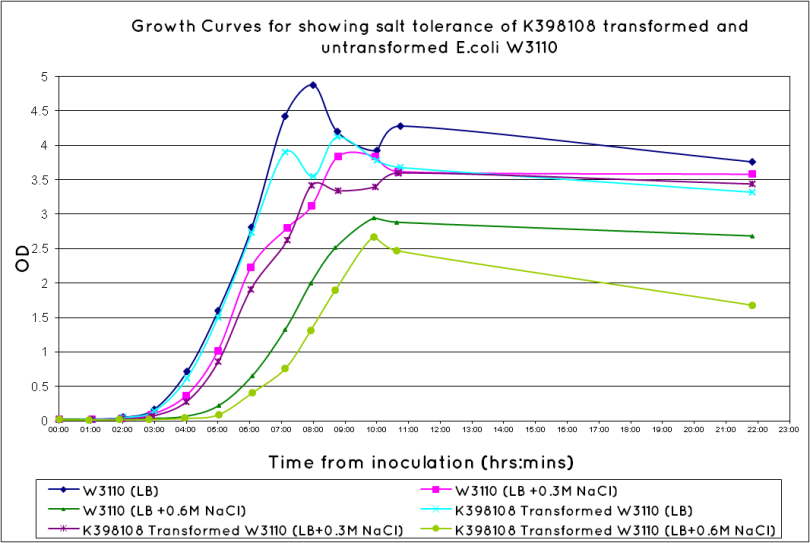Team:University College London/Module 5/Characterisation
From 2012.igem.org
Rwilkinson (Talk | contribs) (Created page with "{{:Team:University_College_London/templates/head|coverpicture=training}} =Module 5: Salt Tolerance= {{:Team:University_College_London/templates/module5menu}} == Characterisatio...") |
Rwilkinson (Talk | contribs) (→Characterisation) |
||
| Line 6: | Line 6: | ||
== Characterisation == | == Characterisation == | ||
| - | We have observed that the results we have obtained for the characterisation of K398108 are consistent with those of the TU Delft '10 iGEM team. From the growth curves obtained, an increase growth rate during the exponential phase is observed in E.Coli expressing K398108 as opposed to the wild type when the salt concentration of the media is elevated. | + | We have observed that the results we have obtained for the characterisation of K398108 are consistent with those of the TU Delft '10 iGEM team. From the growth curves obtained (see graph below), an increase growth rate during the exponential phase is observed in E.Coli expressing K398108 as opposed to the wild type when the salt concentration of the media is elevated. |
However, while we have managed to replicate the results of the TU Delft '10 iGEM team, we question the viability of this BioBrick for conferring salt tolerance in E.Coli. While the growth rate is improved for the cells expressing the BioBrick, the overall exponential growth phase does not - from our results, the final OD of the cells in the stationary phase is not higher than that of the wild-type. | However, while we have managed to replicate the results of the TU Delft '10 iGEM team, we question the viability of this BioBrick for conferring salt tolerance in E.Coli. While the growth rate is improved for the cells expressing the BioBrick, the overall exponential growth phase does not - from our results, the final OD of the cells in the stationary phase is not higher than that of the wild-type. | ||
Revision as of 12:45, 10 August 2012
Module 5: Salt Tolerance
Description | Design | Construction | Characterisation | Modelling | Results | Conclusions
Characterisation
We have observed that the results we have obtained for the characterisation of K398108 are consistent with those of the TU Delft '10 iGEM team. From the growth curves obtained (see graph below), an increase growth rate during the exponential phase is observed in E.Coli expressing K398108 as opposed to the wild type when the salt concentration of the media is elevated.
However, while we have managed to replicate the results of the TU Delft '10 iGEM team, we question the viability of this BioBrick for conferring salt tolerance in E.Coli. While the growth rate is improved for the cells expressing the BioBrick, the overall exponential growth phase does not - from our results, the final OD of the cells in the stationary phase is not higher than that of the wild-type.
Examining the literature, a better gauge of salt tolerance can be found via an increase in OD over the wild type cells in increased salt concentrations, which this BioBrick has not been shown to do. As such, the choice to use K398108 to confer salt tolerance on our cells would remain questionable at best.


 "
"